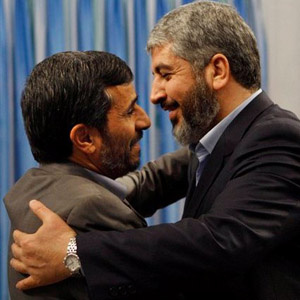A Tale of Two Mahmouds

For many, the famous picture of Mahmoud Ahmadinejad and Khalid Mash’al embracing is the pictorial representation of Iran’s relations with Palestinian groups. But is that a complete picture? Recent developments in Iran and Palestine show me another picture, one that shows two Mahmouds, who despite the surface differences are similar deep inside.
The first is Mahmoud Abbas, born in 26th of March 1935 and known as Abu Mazen. Abbas took over the leadership of Palestinian Authority after the death of Yasser Arafat. Despite being a prominent figure of Fatah and Palestinian Liberation Organization, Abu Mazen failed to exercise an effective leadership over the Palestinian community and from the first day of sitting at the position, made many enemies for himself. Some of his former companions such as Faruq Qaddumi were the first to challenge his leadership. Mahmoud Abbas’ had his powerbase in the security forces of Palestinian Authority headed by Mohammad Dahlan. Overlooking demands of the Palestinian community led to Abbas’ humiliating defeat in 2006 and Hamas’ takeover of the parliament. For the first time, Fatah and PLOhad lost their grip over power.
Hamas’ rule, differences between PLO and Hamas over issues such as interaction with Israel and challenges over power sharing lead to a premature Hamas-PLO face-off. Ultimately, In January 2007 Mahmoud Abbas led a coup against Ismail Haniyah’s elective administration and formed his own cabinet in Ramallah. In response, Hamas tightened its grip over Gaza. With Palestine ripped apart between the two factions, Israel was emboldened to target Gaza with in the most atrocious way. Abbas was quite reluctant to support Gazans under mortal Israeli attacks.
The other Mahmoud is Ahmadinejad who was only 22 when the Islamic Revolution overthrew Shah in 1979. Ahmadinejad held marginal positions during the 8-year war between Iran and Iraq and his first major office was governorship of Ardebil Province when he was 37 years old. With electoral victory of his camp in city council elections of 2003, Ahmadinejad became the mayor of Tehran at the age of forty-seven. Before stepping into his fifties, Ahmadinejad became the sixth Iranian president.
Immediately after entering the presidential house, Ahmadinejad started a powerful smear campaign against the administrations of Hashemi Rafsanjani and Khatami. He marginalized a large number of executives and experts, and whether intentionally or unintentionally, formed a large opposition including the technocrats and senior politicians of the Islamic Republic. His first term of presidency witnessed ignoring, humiliating and at times insulting the Iranian (upper-)middle class, while his excessive attention to lower class of the society just widened the fissure between social classes.
But Ahmadinejad’s masterpiece appeared in the latest presidential election. His accusations against some well-known cleric families in the televised debates and presentation of fabricated data about his economic performance and foreign diplomacy not only brought his opponent politicians closer to each other, but also added a new group of clerics, academicians, traders and civil servants to his enemies. With rising oppositions, Ahmadinejad is becoming further dependent on military and security powerbases, especially the Revolutionary Guards (Sepah) and paramilitary Basij. The Iranian president’s current situation is not dissimilar to Mahmoud Abbas. While nominally head of the Palestinian Authority, Abu Mazen lacks the support of his people. The current rift in the Palestinian community is such that Abbas has no way but to rely on non-Palestinian forces. The United States and some Arab countries used to be his supporters up to a while ago, but the Goldstone Report showed that to stay in power, Abu Mazen is even ready to compromise with the Israelis.
Mahmoud Ahmadinejad is not dependent on foreign powers as Abu Mazen is. But his disregard of the Iranians’ demands can put him in the same track. Will the Iranian president return to the bosom of people or he will select Abu Mazen’s way?

